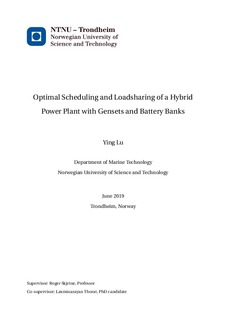Optimal Scheduling and Loadsharing of a Hybrid Power Plant with Gensets and Battery Banks
Master thesis
Permanent lenke
http://hdl.handle.net/11250/2622976Utgivelsesdato
2019Metadata
Vis full innførselSamlinger
- Institutt for marin teknikk [3432]
Sammendrag
The increased power demand of shipboard electrical power system has produced considerable environmental pollution such as heavy fuel consumption and the emission of CO2 andNOx. In response to the degradation in the global environment, the maritime industry is experiencing a technical renovation at an ever-changing pace. The hybrid power system (HPS)which is a promising alternative to reduce fuel consumption, has aroused tremendous research interests. It takes the advantages of both a traditional electric-driven system and theenergy storage devices (ESD), making it has not only higher energy efficiency but also lowernoise and vibration level.
For a HPS, the demand for higher reliability and availability is higher than before. Therefore,a robust and smart power and energy management system (PMS/EMS) is required to controlthe power generation and distribution. PMS protects equipment from failure and reducespower loss, more importantly, maximises the performance through interaction with othercontrol systems.
This thesis looks into the hybrid marine power system and uses the PMS to address thescheduling of gensets and Energy Storage System (ESS). Firstly, the configuration and mechanisms of the hybrid marine power system are described. The HPS model is developed inSimulink, including the genset, bus, ESS, and so forth. Secondly, the peak shaving strategyand optimal load sharing algorithms are proposed. The peak shaving strategy adopts theconcept of energy band limited by ESS energy. The load sharing algorithm is based on thefour working modes among the gensets and ESS. Lastly, two case studies of HPS subjectingto different level time-varying load are presented. The results show that good performancesare achieved regarding load sharing with the mission of fuel consumption minimisation.
